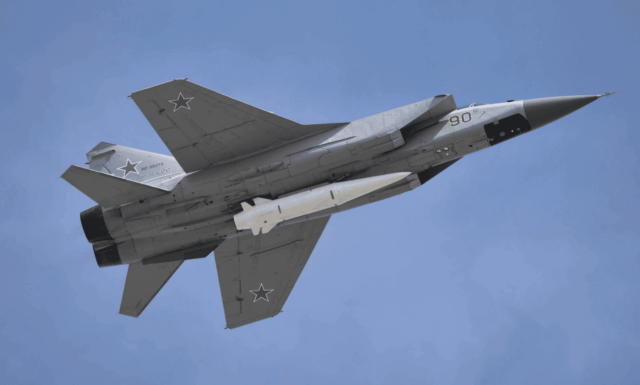
Videos: Russia says it used hypersonic missile for first time in Ukraine A Russian MiG-31 carrying a Kh-47M2 Kinzhal hypersonic missile during a 2018 Russian military parade. (Kremlin photo/Released)
Russian forces in Ukraine claimed to have used an air-launched hypersonic missile for the first time in combat on Saturday, to strike a Ukrainian weapons depot.
In comments to the media, reported by Russia’s state-run Russia Today, Russian Defense Ministry spokesman Igor Konashenko said Russian forces launched a Kinzhal hypersonic missiles at a weapons depot located near the western Ukrainian village of Deliatyn. If true, the launch would be the first time the missile has been fielded in combat.
“Destruction of a weapons depot of the Armed Forces of Ukraine by high-precision missile weapons strike,” the Russian Ministry of Defense tweeted. “We can see the exact hit of an underground hangar with weapons and ammunition.”
▫️Destruction of a weapons depot of the Armed Forces of Ukraine by high-precision missile weapons strike. We can see the exact hit of an underground hangar with weapons and ammunition. pic.twitter.com/sKTF46Tdb0
— Минобороны России (@mod_russia) March 19, 2022
The Kh-47M2 Kinzhal, “Dagger,” is an air-launched hypersonic ballistic missile. The missiles can be carried and launched from a fighter aircraft, such as the MiG-31K “Foxhound” interceptor and attack jet. According to Russia’s military, the Kinzhal can reach Mach 10 speed (about 7,672 miles per hour).
Another video purported to show the missile flying through the sky before striking a target in the distance.
Video purportedly showing the Russian hypersonic "Kinzhal" heading towards a 🇺🇦 underground bunker in Ukraine pic.twitter.com/GI4LjnLiTD
— KT CounterIntelligence (@KremlinTrolls) March 19, 2022
The location of the reported hypersonic missile strike, in western Ukraine, would likely raise concerns among neighboring North Atlantic Treaty Organization (NATO) allies. The village of Deliatyn is located about 46 miles from Ukraine’s border with Romania, and about 88 miles from Ukraine’s border with Hungary. Romania and Hungary are both members of the NATO alliance.
Last week, Russian strikes on the western Ukrainian city of Yavoriv fell within 10 miles of the Polish-Ukrainian border. Poland is another NATO ally.
Russian strikes near Ukraine’s borders with NATO members raise the risk of a miscalculation that could lead to the NATO ally being hit. Such an event risks triggering NATO’s Article 5, which states that if one or more NATO members are targeted with an armed attack, the rest of the alliance will consider it an attack on all of them and will act in collective self-defense. If a Russian attack were to cause NATO to invoke Article 5, it would pit nuclear-armed Russia against nuclear-armed NATO allies, including the U.S., U.K., and France. U.S. President Joe Biden and NATO Secretary-General Jens Stoltenberg have already warned the alliance will “defend every inch of NATO territory.”
Russia’s use of hypersonic weapons could also raise concerns about nuclear-deterrence. The Kinzhal, like other hypersonic missiles, is nuclear-capable and its ability to be deployed from a fighter aircraft allows it to be brought close to a target while limiting detection times from a launch. Russia claims the Kinzhal also has the ability to maneuver to avoid interception.
This week, the director of the U.S. Defense Intelligence Agency (DIA) assessed that mounting losses to Russia’s conventional military forces could lead it to increasingly use its nuclear arsenal to “signal the West and project strength to its internal and external audience.”




